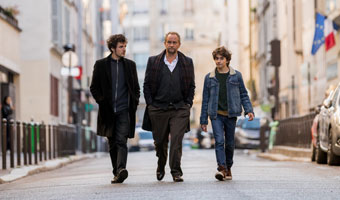Deux fils
Félix Moati

Joseph and his two sons, Joachim and Ivan, were a very close-knit family. But Ivan, the younger of the two, an exceptional secondary school pupil in the midst of a religious crisis, is angry with his two models, that he has seen crumble before his eyes. His big brother Joachim constantly goes over and over again about the end of his relationship, which is endangering his studies as a psychiatrist. And he father decides to trade in his successful career as a doctor to become a failed writer. However, these three men keep permanent watch over each other and are constantly, although somewhat clumsily, looking for love…
With : Vincent Lacoste, Benoît Poelvoorde, Mathieu Capella, Anaïs Demoustier
Screenplay : Félix Moati avec la collaboration de Florence Seyvos
Image : Yves Angelo
Sound : Charlie Cabocel, Antoine Baudouin, Agnès Ravez, Niels Barletta
Editing : Simon Birman
Music : LIMOUSINE
Screenplay : Félix Moati avec la collaboration de Florence Seyvos
Image : Yves Angelo
Sound : Charlie Cabocel, Antoine Baudouin, Agnès Ravez, Niels Barletta
Editing : Simon Birman
Music : LIMOUSINE
Production : Pierre Guyard, Christophe Rossignon, Philip Boëffard, Ève François Machuel (Nord-Ouest Films), Patrick Quinet (Artémis Productions), en coproduction avec France 3 Cinéma, avec la participation de Le Pacte, Canal +, Ciné +, France Télévisions et le soutien
Distribution: Le Pacte
International sales: Le Pacte
Distribution: Le Pacte
International sales: Le Pacte

Félix Moati started in the cinema in LOL by Lisa Azuelos and the horror film Livide. It was his role in Télé Gaucho (Pirate TV) by Michel Leclerc, which made him known to audiences. His performance won him a nomination for the César for Best Hopeful Actor in 2013. In 2016 he was nominated a second time for Best Hopeful Actor for À trois on y va (All About Them) opposite Anaïs Demoustier. After starting behind the camera with the short film Après Suzanne, acclaimed at the 2016 Cannes Film Festival, later presented in Angers, Félix Moati made his first feature, Deux fils (Father and Sons).
“When I was shooting my short film, Après Suzanne, I was already writing the feature. (…) In the short there is a search for a tone, because finding the right tone to your first film means finding the tone you want to give to your own life. That is often what moves me in a feature. I think that fiction takes us into real life and corrects it. (…) In the first sequence of the film, for instance, when the character choose the dead person's coffin, the simple presence of Benoît Poelvoorde protects us from the tragic: he brings comedy and gentleness. There is also jazz in this sequence, the tone of the film is therefore between the two, at the same time serious and light. I really like this in between phase”. (Félix Moati)
“When I was shooting my short film, Après Suzanne, I was already writing the feature. (…) In the short there is a search for a tone, because finding the right tone to your first film means finding the tone you want to give to your own life. That is often what moves me in a feature. I think that fiction takes us into real life and corrects it. (…) In the first sequence of the film, for instance, when the character choose the dead person's coffin, the simple presence of Benoît Poelvoorde protects us from the tragic: he brings comedy and gentleness. There is also jazz in this sequence, the tone of the film is therefore between the two, at the same time serious and light. I really like this in between phase”. (Félix Moati)
